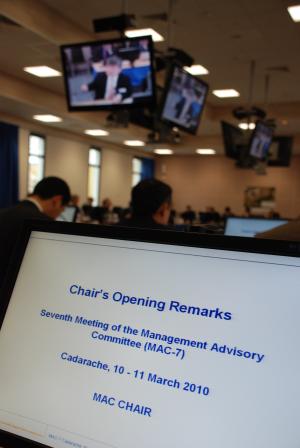Technically credible and achievable
The ITER Management Advisory Committee (MAC) convened this week to review the project's proposed "improved Updated Schedule" and the results of work undertaken since the Council meeting in November last year. The new proposal, which has undergone thorough risk analysis since November, had been presented to senior representatives from all seven Members in an ad-hoc meeting in Paris earlier this year, where general support for the updated roadmap was shown.
At the end of its two-day assessment, the MAC reached the conclusion that "this schedule, under which First Plasma would be attained in early November 2019, appears to be technically-credible and achievable, and in line with delivery dates that the Domestic Agencies assess to be realistically achievable."
In its report to the ITER Council, the MAC writes: "The ITER Organization is invited to use the 2 November 2019 schedule as the basis for its further preparation of the overall ITER Baseline Documentation [..] with a view to its adoption at the ITER Council meeting on 16-17 June 2010."
As soon as the ITER Director-General Kaname Ikeda and his Principal Deputy Director-General Norbert Holtkamp had finished their progress reports, it became clear that there was appreciation for work accomplished. "We are pleased to see the improvements made," said Richard Hawryluk, the leader of the US delegation who was the first to comment. "We are happy to note that things are finally converging," Pucadyil Ittoop John, leader of the Indian delegation, added. Martin Drew, speaking on behalf the European delegation, voiced the opinion that "we are in a much healthier position then we were six months ago."
Gyung-Su Lee, Chairman of the MAC, showed himself satisfied with the outcome of this seventh meeting. "The objectives have been fulfilled," he stated. "This consensus on the improved Updated Schedule was an important step. But we are not yet there. Now the figures have to be added to this schedule in order to finalize the Baseline documentation for the Council meeting in June. This will be quite a challenge, but it can be done."


